Stop Caretaking the Borderline
or Narcissist
Stop Caretaking the Borderline
or Narcissist
How to End the Drama and Get on
with Life
Margalis Fjelstad, PhD
ROWMAN & LITTLEFIELD PUBLISHERS, INC.
Lanham Boulder New York Toronto Plymouth, UK
Published by Rowman & Littlefield Publishers, Inc.
A wholly owned subsidiary of The Rowman & Littlefield Publishing Group, Inc.
4501 Forbes Boulevard, Suite 200, Lanham, Maryland 20706
www.rowman.com
10 Thornbury Road, Plymouth PL6 7PP, United Kingdom
Copyright 2013 by Rowman & Littlefield Publishers, Inc.
All rights reserved. No part of this book may be reproduced in any form or by any electronic or mechanical means, including information storage and retrieval systems, without written permission from the publisher, except by a reviewer who may quote passages in a review.
British Library Cataloguing in Publication Information Available
Library of Congress Cataloging-in-Publication Data
Fjelstad, Margalis, 1945-
Stop caretaking the borderline or narcissist : how to end the drama and get on with life / Margalis Fjelstad.
p. cm.
Includes bibliographical references and index.
ISBN 978-1-4422-2018-8 (cloth : alk. paper) ISBN 978-1-4422-2019-5 (electronic)
1. Narcissism. 2. NarcissistsFamily relationships. 3. Enabling (Psychology) 4. Codependency. I. Title.
BF575.N35F54 2013
155.2'32dc23
2012040275

The paper used in this publication meets the minimum requirements of American National Standard for Information Sciences Permanence of Paper for Printed Library Materials, ANSI/NISO Z39.48-1992.
Printed in the United States of America
This above allto thine ownself be true; And it must follow, as the night the day, Thou canst not then be false to any man. William Shakespeare, Hamlet
Contents
I: Understanding the Caretaker Role
| 1 | Is My Partner Really a Borderline or Narcissist? |
| 2 | Why the Borderline/Narcissist Needs a Caretaker |
| 4 | Caretaker Involvement Levels |
| 5 | Emotional Distortions of Caretakers |
| 6 | Thought Distortions of Caretakers |
| 7 | Behavioral Distortions of Caretakers |
| 8 | Distortions in the Sense of Self |
| 9 | Relationship Distortions of Caretakers |
II: Letting Go of Caretaking
| 11 | Challenging the BP/NP Family Rules |
| 12 | Beginning to Heal: Embracing New Beliefs and Behaviors |
| 13 | Increasing Your Self-Confidence |
| 14 | Nurturing and Caring for Yourself |
| 15 | Anxiety-Reducing Skills with the BP/NP |
| 16 | Change-Creating Skills with the BP/NP |
III: Rebuilding
| 18 | Moving Forward in a Healthy Way |
Appendix: Caretaker Test
Notes
Bibliography
Index
About the Author
I
Understanding the Caretaker Role
INTRODUCTION: HOW CAN YOU TELL IF YOURE A CARETAKER?
Is your stomach in knots much of the time? Do have headaches or backaches and feel tense too much of the time around your partner? And do these feelings alternate with a sense of total bliss and relaxation when your partner is in a good mood? Do you feel like youre living with two different people, one who is loving and attentive and one who is mean, angry, critical, and attacking at other times? Do you wish the person you married was the person who is there with you all of the time?
Do you feel responsible to make your life together work by being perfect, always trying to be there to meet your partners needs and making amends even when youre not sure what you did? Do you try to cheer her up, but even when things are going really well she gets depressed? Do you try to soothe him when he is angry and storms off in the middle of a family gathering? Do you even feel responsible when she feels suicidal?
Does it come second nature to you to think you did something wrong when someone else is upset? Do you hate conflict? Are you competent and effective at work and seem to get along with almost everyone, yet at home your spouse accuses you of being selfish, uncaring, hurtful, and thoughtless?
Do you take these accusations from your loved one time after time, trying harder and harder to make things right and then, when you are finally frustrated, explode, feel guilty, and blame yourself for not being able to please your partner? When you were growing up, did you have a family member, mother, father, sibling, or grandparent who acted like your partner acts today?
Do you just wish for a peaceful, calm life that is predictable, supportive, friendly, and easygoing? Do you feel taken advantage of when you are trying hard to do a good job and your partner slacks off and yet gets all the praise and attention? Do you feel a sense of guilt, foreboding, and confusion when you think about your life? Do you often feel tired, overwhelmed, and alone in your relationship? Have you tried numerous times to work on your relationship with your partner but nothing ever seems to change?
If these descriptions are a picture of your life, if you feel like you are in a crazy-making relationship, if you feel you are becoming more depressed and anxious rather than the easygoing, calm person you were before this relationship, it is very likely that you are a Caretaker for a borderline/narcissist person.
How did you get to this place? More important, how can you get out of this place? Thats what this book is all about.
No, you are not crazy. But you are in a crazy-making relationship. If your life seems calm, positive, and moving forward outside of this relationship but this relationship feels like the description above, you are probably involved with a borderline or narcissistic person. This book will be describing the symptoms of the borderline and narcissism disorders as well as how you got hooked into being a Caretaker. We will look at why you got into and continue to stay in this relationship, your role in making the relationship work, and the things you can do to change it.
Your focus since you became involved with the borderline/narcissist has been on him or her. You may have found yourself thinking more about your partners thoughts, feelings, needs, wants, and behaviors than you think about your own. You may have the mistaken idea that this is normal in relationships, but it isnt. Your increasing depression, anxiety, tension, and confusion arent normal either. In fact, you may have completely lost your sense of what is normal.
This book is about getting back to a normal life, a healthy life, your life. Its about learning to defocus from the borderline/narcissists dramas, over-the-top emotionality, and push/pull, love/hate interactions and going back to creating a peaceful, enjoyable, low-key life that is healthy, positive, and relaxing.


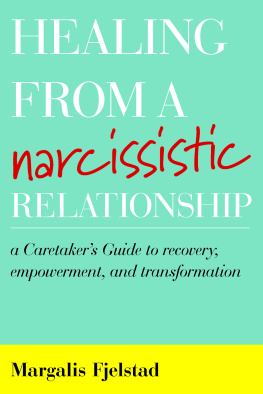

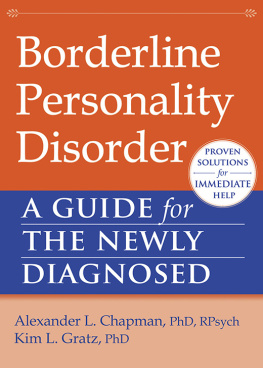
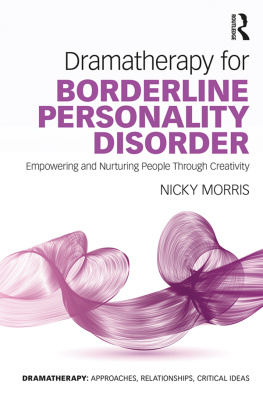
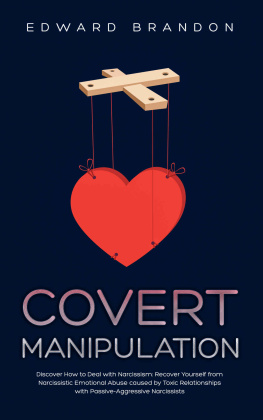
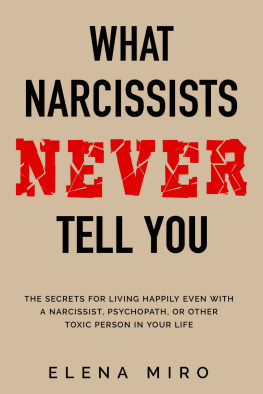
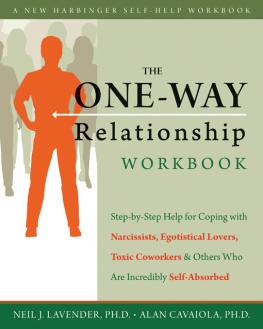
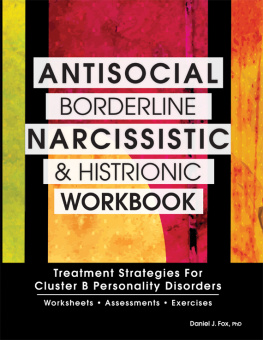
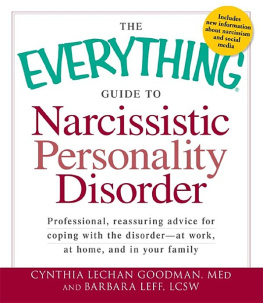
 The paper used in this publication meets the minimum requirements of American National Standard for Information Sciences Permanence of Paper for Printed Library Materials, ANSI/NISO Z39.48-1992.
The paper used in this publication meets the minimum requirements of American National Standard for Information Sciences Permanence of Paper for Printed Library Materials, ANSI/NISO Z39.48-1992.